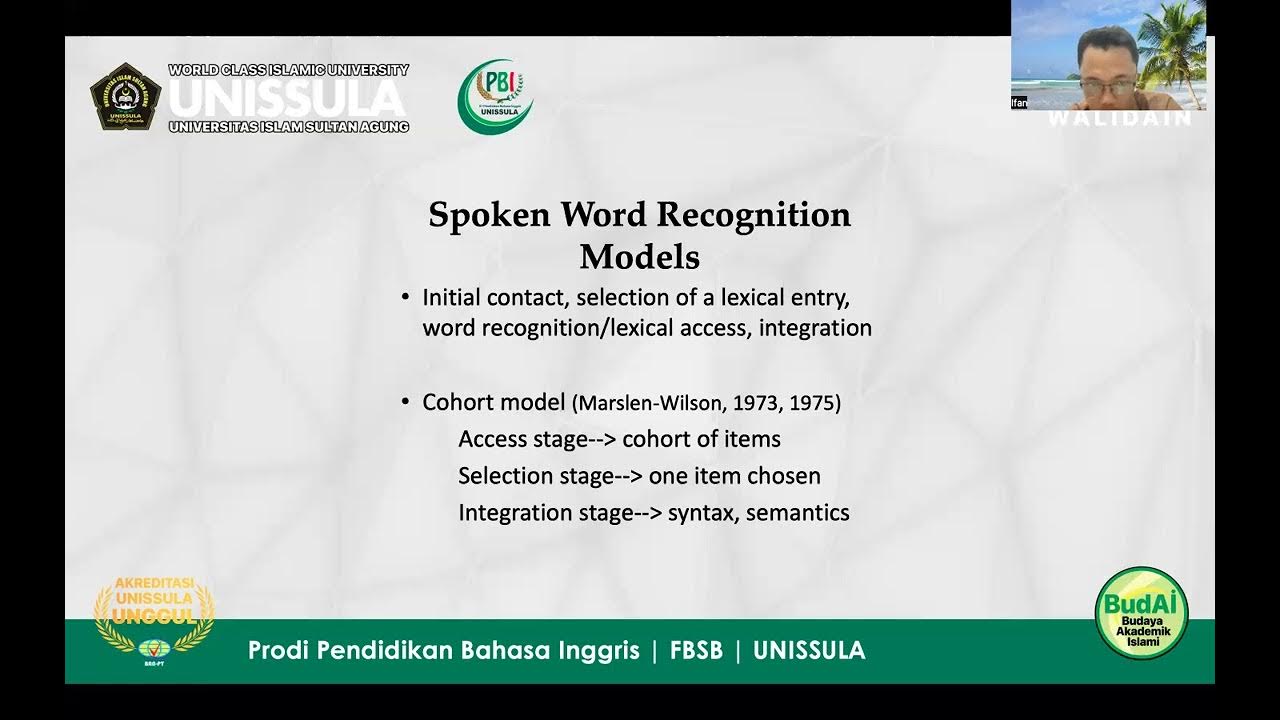3. Perkembangan Kemampuan Bahasa
Summary
TLDRIn this educational psychology lecture, Dini Martina discusses the development of language skills in humans, emphasizing the importance of language for communication and cognitive processing. The lecture outlines five key components of language: phonology, morphology, syntax, semantics, and pragmatics. It also explores the biological and environmental factors influencing language acquisition, detailing stages of language development from infancy through adolescence. Each stage is marked by milestones such as babbling, the formation of simple sentences, and increased vocabulary. The lecture encourages students to engage with diverse resources to deepen their understanding of educational psychology.
Takeaways
- 😀 Language is essential for daily communication, encompassing speaking, listening, reading, and writing.
- 📚 Language consists of symbols and follows grammatical rules, which includes vocabulary and syntax.
- 🔊 Phonology is the study of sounds in language, focusing on phonemes, the basic sound units that affect meaning.
- 🔤 Morphology involves understanding the structure of words and their meanings in language.
- 🔗 Syntax refers to the arrangement of words to form phrases, clauses, and complete sentences.
- 🔍 Semantics deals with the meanings of words and expressions, crucial for effective communication.
- 🗣️ Pragmatics relates to the skills of using language appropriately in various contexts.
- 🧠 Biological factors, such as brain function and sensory processing, play a significant role in language development.
- 🌍 Environmental factors, including interaction with parents and peers, significantly influence language skills.
- 👶 Language development occurs in stages, starting from cooing in infancy to complex language use in adolescence.
Q & A
What is the primary focus of the lecture on language development?
-The lecture discusses the importance of language development in communication, covering aspects such as speaking, listening, reading, and writing.
What are the five systems of language development mentioned in the lecture?
-The five systems are phonology, morphology, syntax, semantics, and pragmatics.
Can you explain the concept of phonology?
-Phonology is the sound system of a language, including the sounds used and how they combine. It also involves the concept of phonemes, which are the smallest sound units that affect meaning.
What role does morphology play in language development?
-Morphology involves understanding meanings based on root words and grammatical units, helping in identifying basic units of language.
How is syntax defined in the context of language development?
-Syntax refers to the structure that governs how words combine to form phrases, clauses, and sentences.
What is the significance of semantics in language?
-Semantics pertains to the meanings of words, which are essential for expressing and communicating various concepts and thoughts.
What does pragmatics encompass in language usage?
-Pragmatics involves the skill of using language appropriately in various contexts, ensuring effective communication.
What biological factors influence language development?
-Biological factors include the functioning of different brain areas in processing spoken and written language, and any damage to these areas can hinder speech abilities.
How do environmental factors affect language acquisition in children?
-Environmental factors such as family, peers, and socio-cultural contexts play a crucial role by providing social interactions and models for children to imitate and learn language.
What are the stages of language development outlined in the lecture?
-The stages include infancy (cooing and first words), early childhood (vocabulary growth and sentence formation), middle to late childhood (reading and writing skills), and adolescence (enhanced complex language use).
What skills do adolescents develop in their language use according to the lecture?
-Adolescents improve their ability to organize ideas in writing, distinguish between general and specific points, and structure their compositions effectively.
What recommendation is given to students for further learning about language development?
-Students are encouraged to read academic references, including national and international journals related to educational psychology.
Outlines

This section is available to paid users only. Please upgrade to access this part.
Upgrade NowMindmap

This section is available to paid users only. Please upgrade to access this part.
Upgrade NowKeywords

This section is available to paid users only. Please upgrade to access this part.
Upgrade NowHighlights

This section is available to paid users only. Please upgrade to access this part.
Upgrade NowTranscripts

This section is available to paid users only. Please upgrade to access this part.
Upgrade NowBrowse More Related Video

Generative Linguistics and Cognitive Psychology

TEAL_2 Understanding Language Acquisition

PENGANTAR PSIKOLINGUISTIK

The Evolution of the Cerebral Cortex: How Primates Changed the Brain Game

PSY101 - Psycholinguistics - An Overview

(Lecture-1) Understanding Language, Primitive Notions about Language, Definitions of Language
5.0 / 5 (0 votes)